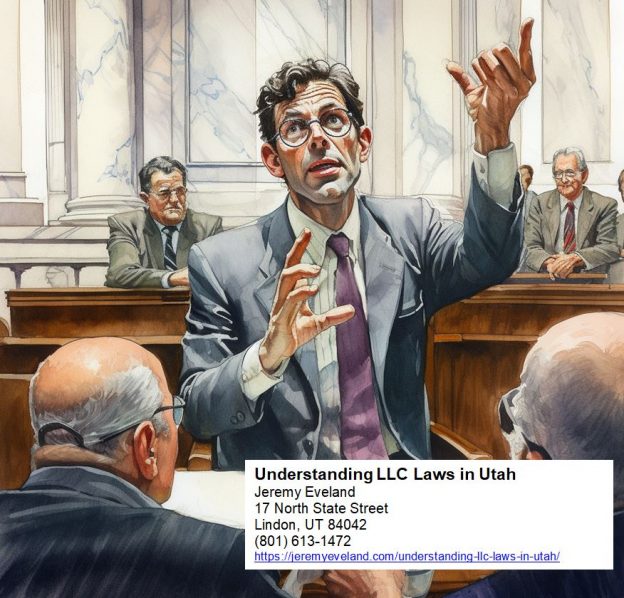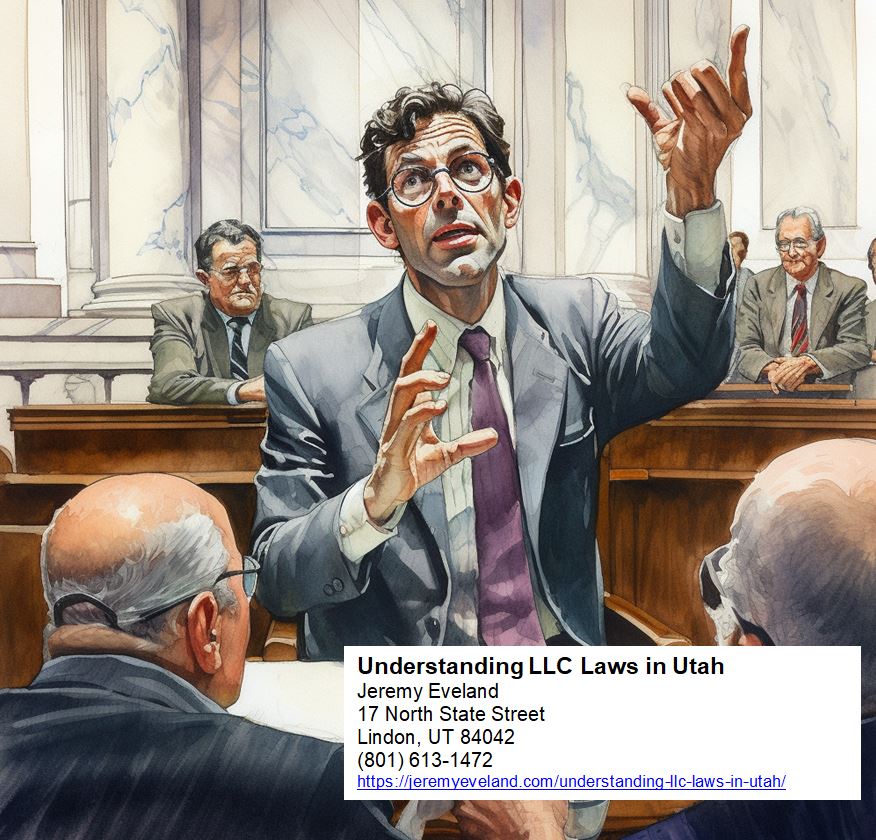-
Business Lawyer
- Introduction
- What Are the Advantages of Using a Professional to Draft a Shareholder Agreement in Utah?
- What Are the Common Mistakes to Avoid When Drafting a Shareholder Agreement in Utah?
- How to Resolve Disputes in a Shareholder Agreement in Utah?
- What Are the Legal Requirements for a Shareholder Agreement in Utah?
- What Are the Tax Implications of a Shareholder Agreement in Utah?
- How to Draft a Comprehensive Shareholder Agreement in Utah?
- What Are the Key Provisions of a Shareholder Agreement in Utah?
- What Are the Benefits of Having a Shareholder Agreement in Utah?
“Secure Your Shareholder Rights in Utah with a Shareholder Agreement!”
Introduction
Shareholder Agreements in Utah are an important tool for businesses to protect their interests and ensure that their shareholders are on the same page. They are legally binding documents that outline the rights and responsibilities of each shareholder, as well as the company’s management and operations. They can also provide a framework for resolving disputes between shareholders and the company. Shareholder Agreements in Utah are an important part of any business, and should be taken seriously.
What Are the Advantages of Using a Professional to Draft a Shareholder Agreement in Utah?
Using a professional to draft a shareholder agreement in Utah has many advantages. A professional can provide expertise and experience in the legal and business aspects of the agreement. They can help ensure that the agreement is legally binding and enforceable, and that it meets the needs of all parties involved.
A professional can also provide guidance on the best way to structure the agreement, including the rights and responsibilities of each shareholder. They can help ensure that the agreement is tailored to the specific needs of the business and its shareholders. This can help to avoid potential disputes and misunderstandings in the future.
A professional can also provide advice on the tax implications of the agreement, as well as any other legal considerations. This can help to ensure that the agreement is compliant with all applicable laws and regulations.
Finally, a professional can provide assistance in negotiating the terms of the agreement. They can help to ensure that all parties are satisfied with the terms of the agreement and that it is fair and equitable for all involved. This can help to ensure that the agreement is mutually beneficial and that it is in the best interests of all parties.
What Are the Common Mistakes to Avoid When Drafting a Shareholder Agreement in Utah?
When drafting a shareholder agreement in Utah, it is important to avoid common mistakes that could lead to costly legal disputes. Here are some of the most common mistakes to avoid when drafting a shareholder agreement in Utah:
1. Not including a dispute resolution clause: A dispute resolution clause should be included in the shareholder agreement to provide a mechanism for resolving disputes between shareholders. This clause should outline the process for resolving disputes, such as mediation or arbitration.
2. Not addressing minority shareholder rights: Minority shareholders should be given certain rights, such as the right to inspect the company’s books and records, the right to receive dividends, and the right to vote on certain matters. These rights should be clearly outlined in the shareholder agreement.
3. Not addressing the transfer of shares: The shareholder agreement should include provisions regarding the transfer of shares, such as restrictions on who can purchase shares and the process for transferring shares.
4. Not addressing the dissolution of the company: The shareholder agreement should include provisions regarding the dissolution of the company, such as how the assets will be distributed and who will be responsible for any outstanding debts.
5. Not addressing the management of the company: The shareholder agreement should include provisions regarding the management of the company, such as who will be responsible for making decisions and how decisions will be made.
By avoiding these common mistakes when drafting a shareholder agreement in Utah, you can help ensure that your agreement is legally binding and enforceable.
How to Resolve Disputes in a Shareholder Agreement in Utah?
Disputes between shareholders in Utah can be resolved in a variety of ways. The most common method is through negotiation and mediation. Negotiation involves the parties discussing the issue and attempting to reach an agreement. Mediation involves a neutral third party who helps the parties reach a resolution.
If the parties are unable to resolve the dispute through negotiation or mediation, they may choose to pursue litigation. Litigation involves filing a lawsuit in court and having a judge or jury decide the outcome.
In addition to negotiation, mediation, and litigation, there are other methods of dispute resolution that may be included in a shareholder agreement. These include arbitration, which is similar to litigation but is conducted by a private arbitrator, and binding decision-making, which is a process in which the parties agree to be bound by the decision of a neutral third party.
No matter which method of dispute resolution is chosen, it is important that the parties understand their rights and obligations under the shareholder agreement. It is also important that the parties understand the process and the potential outcomes. It is recommended that the parties seek legal advice before entering into any dispute resolution process.
What Are the Legal Requirements for a Shareholder Agreement in Utah?
A shareholder agreement is a legally binding contract between the shareholders of a company that outlines the rights and responsibilities of each shareholder. In Utah, there are certain legal requirements that must be met in order for a shareholder agreement to be valid.
First, the agreement must be in writing and signed by all of the shareholders. This is necessary to ensure that all parties are aware of the terms of the agreement and that they have agreed to them.
Second, the agreement must include the name of the company, the number of shares held by each shareholder, and the rights and responsibilities of each shareholder. This is important to ensure that all shareholders understand their rights and obligations under the agreement.
Third, the agreement must be filed with the Utah Division of Corporations. This is necessary to ensure that the agreement is legally binding and enforceable.
Finally, the agreement must be reviewed by an attorney to ensure that it meets all of the legal requirements in Utah. This is important to ensure that the agreement is valid and enforceable.
By following these legal requirements, a shareholder agreement in Utah can be created that is legally binding and enforceable. It is important to ensure that all shareholders understand their rights and obligations under the agreement and that the agreement is properly filed with the Utah Division of Corporations.
What Are the Tax Implications of a Shareholder Agreement in Utah?
The tax implications of a shareholder agreement in Utah depend on the specific terms of the agreement. Generally, the Internal Revenue Service (IRS) considers a shareholder agreement to be a contract between the shareholders of a corporation. As such, the IRS will treat the agreement as a taxable event if it results in a transfer of money or property between the shareholders.
In Utah, the taxation of a shareholder agreement depends on the type of agreement. For example, if the agreement involves the sale of shares, the sale may be subject to capital gains tax. If the agreement involves the transfer of assets, the transfer may be subject to gift tax. Additionally, if the agreement involves the payment of dividends, the dividends may be subject to income tax.
In addition to the taxation of the agreement itself, the IRS may also impose taxes on the income generated by the agreement. For example, if the agreement involves the payment of dividends, the dividends may be subject to income tax. Similarly, if the agreement involves the sale of shares, the proceeds may be subject to capital gains tax.
Finally, the IRS may also impose taxes on the profits generated by the agreement. For example, if the agreement involves the sale of shares, the profits may be subject to corporate income tax. Additionally, if the agreement involves the payment of dividends, the profits may be subject to corporate income tax.
It is important to note that the taxation of a shareholder agreement in Utah may vary depending on the specific terms of the agreement. Therefore, it is important to consult with a qualified tax professional to ensure that all applicable taxes are properly accounted for.
How to Draft a Comprehensive Shareholder Agreement in Utah?
A comprehensive shareholder agreement is an important document for any business in Utah. It outlines the rights and responsibilities of the shareholders and provides a framework for how the company will be managed. It is important to ensure that the agreement is tailored to the specific needs of the business and its shareholders.
Step 1: Identify the Parties Involved
The first step in drafting a comprehensive shareholder agreement is to identify the parties involved. This includes the company, the shareholders, and any other parties that may have an interest in the company. It is important to include all relevant parties in the agreement.
Step 2: Outline the Rights and Responsibilities of the Shareholders
The next step is to outline the rights and responsibilities of the shareholders. This includes the right to vote on company matters, the right to receive dividends, and the right to inspect the company’s books and records. It is important to clearly define the rights and responsibilities of each shareholder.
Step 3: Establish the Management Structure
The third step is to establish the management structure of the company. This includes the roles and responsibilities of the board of directors, the officers, and any other management personnel. It is important to ensure that the management structure is clearly defined and that all parties understand their roles and responsibilities.
Step 4: Outline the Procedures for Making Decisions
The fourth step is to outline the procedures for making decisions. This includes the voting process, the quorum requirements, and the procedures for resolving disputes. It is important to ensure that all shareholders understand the procedures for making decisions and that they are followed.
Step 5: Establish the Procedures for Transferring Shares
The fifth step is to establish the procedures for transferring shares. This includes the process for transferring shares, the restrictions on transfers, and the procedures for resolving disputes. It is important to ensure that all shareholders understand the procedures for transferring shares and that they are followed.
Step 6: Finalize the Agreement
The final step is to finalize the agreement. This includes reviewing the agreement with all parties involved, making any necessary changes, and having all parties sign the agreement. It is important to ensure that all parties understand the agreement and that it is legally binding.
By following these steps, businesses in Utah can draft a comprehensive shareholder agreement that is tailored to their specific needs. It is important to ensure that all parties understand their rights and responsibilities and that the agreement is legally binding.
What Are the Key Provisions of a Shareholder Agreement in Utah?
A shareholder agreement is a legally binding contract between the shareholders of a company that outlines the rights and responsibilities of each shareholder. In Utah, the key provisions of a shareholder agreement typically include:
1. Ownership Rights: This section outlines the ownership rights of each shareholder, including the percentage of ownership, voting rights, and the right to receive dividends.
2. Management: This section outlines the roles and responsibilities of each shareholder in the management of the company, including the appointment of officers and directors.
3. Transfer of Shares: This section outlines the process for transferring shares, including the right of first refusal and the right of first offer.
4. Dispute Resolution: This section outlines the process for resolving disputes between shareholders, including mediation and arbitration.
5. Dissolution: This section outlines the process for dissolving the company, including the distribution of assets and liabilities.
6. Indemnification: This section outlines the rights and responsibilities of each shareholder in the event of a lawsuit or other legal action.
7. Non-Compete: This section outlines the restrictions on each shareholder’s ability to compete with the company.
8. Confidentiality: This section outlines the restrictions on each shareholder’s ability to disclose confidential information.
By including these key provisions in a shareholder agreement, shareholders in Utah can ensure that their rights and responsibilities are clearly defined and that their interests are protected.
What Are the Benefits of Having a Shareholder Agreement in Utah?
Having a shareholder agreement in Utah can provide a number of benefits to shareholders. A shareholder agreement is a contract between the shareholders of a company that outlines the rights and responsibilities of each shareholder. It can provide clarity and certainty to shareholders, as well as protect their interests.
One of the primary benefits of having a shareholder agreement in Utah is that it can help to ensure that the company is managed in a way that is beneficial to all shareholders. The agreement can outline the roles and responsibilities of each shareholder, as well as the decision-making process. This can help to ensure that all shareholders are on the same page and that decisions are made in the best interests of the company.
Another benefit of having a shareholder agreement in Utah is that it can help to protect the interests of minority shareholders. The agreement can outline the rights of minority shareholders, such as the right to vote on certain matters or the right to receive certain information. This can help to ensure that minority shareholders are not taken advantage of by the majority shareholders.
Finally, having a shareholder agreement in Utah can help to ensure that the company is run in a way that is compliant with state and federal laws. The agreement can outline the procedures for handling certain matters, such as the election of directors or the approval of certain transactions. This can help to ensure that the company is operating in a legal and ethical manner.
Overall, having a shareholder agreement in Utah can provide a number of benefits to shareholders. It can help to ensure that the company is managed in a way that is beneficial to all shareholders, protect the interests of minority shareholders, and ensure that the company is operating in a legal and ethical manner.
Areas We Serve
We serve individuals and businesses in the following locations:
Salt Lake City Utah
West Valley City Utah
Provo Utah
West Jordan Utah
Orem Utah
Sandy Utah
Ogden Utah
St. George Utah
Layton Utah
South Jordan Utah
Lehi Utah
Millcreek Utah
Taylorsville Utah
Logan Utah
Murray Utah
Draper Utah
Bountiful Utah
Riverton Utah
Herriman Utah
Spanish Fork Utah
Roy Utah
Pleasant Grove Utah
Kearns Utah
Tooele Utah
Cottonwood Heights Utah
Midvale Utah
Springville Utah
Eagle Mountain Utah
Cedar City Utah
Kaysville Utah
Clearfield Utah
Holladay Utah
American Fork Utah
Syracuse Utah
Saratoga Springs Utah
Magna Utah
Washington Utah
South Salt Lake Utah
Farmington Utah
Clinton Utah
North Salt Lake Utah
Payson Utah
North Ogden Utah
Brigham City Utah
Highland Utah
Centerville Utah
Hurricane Utah
South Ogden Utah
Heber Utah
West Haven Utah
Bluffdale Utah
Santaquin Utah
Smithfield Utah
Woods Cross Utah
Grantsville Utah
Lindon Utah
North Logan Utah
West Point Utah
Vernal Utah
Alpine Utah
Cedar Hills Utah
Pleasant View Utah
Mapleton Utah
Stansbury Par Utah
Washington Terrace Utah
Riverdale Utah
Hooper Utah
Tremonton Utah
Ivins Utah
Park City Utah
Price Utah
Hyrum Utah
Summit Park Utah
Salem Utah
Richfield Utah
Santa Clara Utah
Providence Utah
South Weber Utah
Vineyard Utah
Ephraim Utah
Roosevelt Utah
Farr West Utah
Plain City Utah
Nibley Utah
Enoch Utah
Harrisville Utah
Snyderville Utah
Fruit Heights Utah
Nephi Utah
White City Utah
West Bountiful Utah
Sunset Utah
Moab Utah
Midway Utah
Perry Utah
Kanab Utah
Hyde Park Utah
Silver Summit Utah
La Verkin Utah
Morgan Utah
Shareholder Agreement Lawyer Consultation
When you need help from a Utah Lawyer about a Shareholder Agreement, call Jeremy D. Eveland, MBA, JD (801) 613-1472 for a consultation.
Jeremy Eveland
17 North State Street
Lindon UT 84042
(801) 613-1472
Related Posts
Business Lawyer Clearfield Utah
Business Lawyer American Fork Utah
How To Handle Customer Complaints In Utah
Business Lawyer Saratoga Springs Utah
The Role of Business Law in Protecting Minority Shareholder Rights
What Are The 4 Different Types of Business Law?
Business Lawyer Washington Utah
Business Lawyer South Salt Lake Utah
Legal Requirements for Utah Technology Startups
Business Lawyer Farmington Utah
Due Diligence For Buying A Utah Business
Understanding Utah’s Labor Laws
Business Lawyer North Salt Lake Utah
Product Liability Laws in Utah
Preventing Cybersecurity Breaches
Business Lawyer North Ogden Utah
Business Lawyer Brigham City Utah
Mastering Business Law: Key Essentials For Success




















